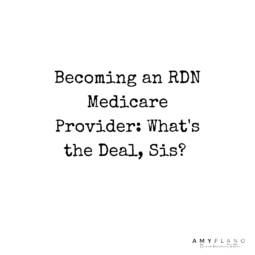To Medicare? Or not to Medicare? That is the question!
As the Reimbursement Representative (now known as the insurance payment specialist) for Connecticut, I was asked to speak about my experience of being an RDN Medicare Provider on a recent board meeting call. And the more I thought about it. The more I thought it would be helpful to share with you why I think becoming an RDN Medicare Provider is a pretty awesome idea.
Full disclosure. I have been an RDN Medicare Provider since 2008. And like anything insurance-based it took me a long time to figure shit out. So don’t worry if enrolling with Medicare seems like a beast to navigate. Believe it or not, it’s actually one of the easiest insurance companies to work with. So don’t stress!
And if you are struggling with Medicare I am always here to help. My Group Reimbursement Coaching Program covers Medicare enrollment in a seamless fashion.
But without further ado here are my 6 reasons why being an RDN Medicare Provider is pretty awesome.
6 Awesome Reasons for Becoming an RDN Medicare Provider
- An Incredible Population: You get to serve an incredible population. Medicare beneficiaries are 65 years old (and up). Or they qualify for Medicare based on disability. Medicare peeps are a lovely bunch of patients. They are typically kind, polite, respectful, curious (in a good way!) and almost always show up on time. Medicare peeps are generally excited to learn and actually do their ‘homework’ when you ask them. Therefore, working with this population can be tremendously rewarding. Some of my most memorable clients have been my Medicare patients. And still ones to this day whom I will never forget.
- They NEED us. From a dietary intervention standpoint, Medicare beneficiaries are ripe for MNT. Often their baseline level of education surrounding their disease(s) is low. In addition, they are on a limited budget and benefit tremendously from learning how to eat healthfully within their discretionary funds. Furthermore, many Medicare beneficiaries have several comorbidities in addition to either their diabetes or non-dialysis chronic kidney disease. Through our awesome skillset as RDNs, we can help them successfully navigate dietary interventions that help optimize their health and standard of living.
Did you know?
- Easy to know what is covered. As of right now (May 2021) MNT for any form of diabetes stages 3-5 non-dialysis chronic kidney disease, and up to 36 months post kidney transplant are covered by Medicare. As long as the patient hasn’t used up their benefits for MNT for the year with another dietitian – then you will receive 12 units of coverage the first year of the referral and an additional 8 units every year after. So there is no guessing. And certainly no need to verify coverage. Even if the patient has a Medicare Advantage plan the coverage is pretty much also consistent with what I just noted.
- Unlimited visits. Yes, we are limited in scope for what we can use for units for CPT codes 97802 & 97803. But if the patient experiences a change in status that is communicated (to or) with the referring physician and we secure a second referral we can use G codes. G codes are particular to Medicare. Certain G codes can provide additional visits (in my experience fairly unlimited based on medical necessity!) beyond the 12 and 8 units respectively. Therefore, please don’t think you are ONLY limited to a low amount of actual visits with your Medicare patients. They need us! And as long as we follow the correct CMS protocol for securing additional visits we are golden.
The Nitty Gritty of Being an RDN Medicare Provider
- Gatekeeper for secondary plans. Often a patient might have Medicare as their primary insurance. In addition, they have a secondary commercial insurance plan (like BlueCross BlueShield, Cigna, United Health Care, Aetna, or Humana). Say the patient has celiac disease. You know you can’t bill Medicare for that diagnosis. However, you called the patient’s secondary insurance and they gave you the green light for coverage for celiac disease. But guess what?
In order to bill the secondary, you NEED to first bill the primary (Medicare) and wait for the rejection. THEN you submit to the secondary insurance. And the plot thickens. To get the original rejection from Medicare you MUST be an RDN Medicare Provider. So even though you are in-network with the patient’s secondary insurance plan. You also MUST be in-network with Medicare. So it really pays to be a Medicare provider even if diabetes and renal disease is not your jam.
- Pay is solid. Medicare is typically the middle of the road for insurance reimbursement. They are not my highest payer. BUT they are certainly not my lowest payer either. I feel adequately compensated for my services when paid by Medicare. Plus, because it is a federal insurance plan, the fee schedule is public knowledge. Therefore, you can find the exact rates for your state. For example, in CT we receive $34.37 per 15 minutes (1 unit) on an initial visit. And $29.60 per 15 minutes on a follow-up visit. Depending on how long your visits those rates are not too shabby. You can make more in 15 minutes as an RDN Medicare provider THAN you would make in exchange for 1 full hour of your time working a clinical job.
Phew. That is a lot of information. But I hope if you are on the fence about becoming an RDN Medicare Provider I have convinced you to just go for it. They are a great bunch of patients to work with, desperately need our help, are straightforward to bill and Medicare reimburses us quite nicely.
Are you already credentialed with the insurance companies and know how to bill the commercial carriers BUT want to add Medicare to your bag of tricks and become an RDN Medicare Provider?
Then apply to my badass monthly reimbursement coaching program. I have an entire Medicare course that coaches you through the Medicare enrollment, billing, and payment process. Plus, you receive access to the resources, webinars, live calls and office hours that come standard with the monthly membership fees.
Check it out here. When I tell you it is AWESOME I am not lying!



Reader Interactions
Hi Amy, are you saying that MNT IS ONLY covered for any form of diabetes stages 3-5 non-dialysis chronic kidney disease, and up to 36 months post kidney transplant are covered by Medicare? Sounds like z71.3 would not qualify for reimbursement with Medicare?
Correct. Medicare DOES NOT cover preventative nutrition currently. As mentioned just diabetes & stages 3-5 non-dialysis CKD> They DO NOT accept Z71.3